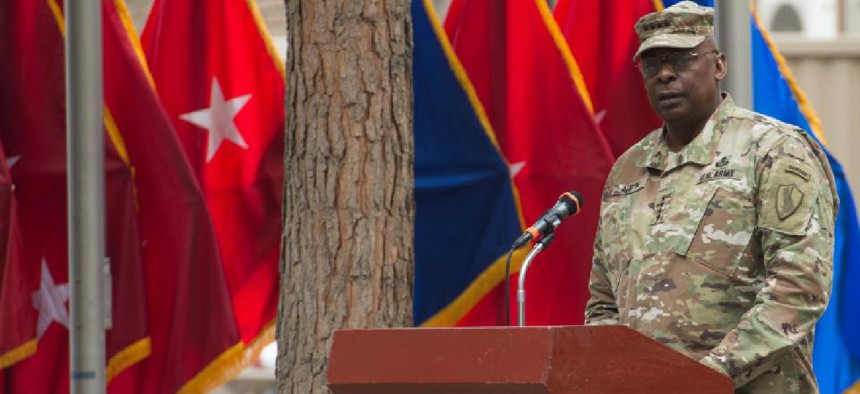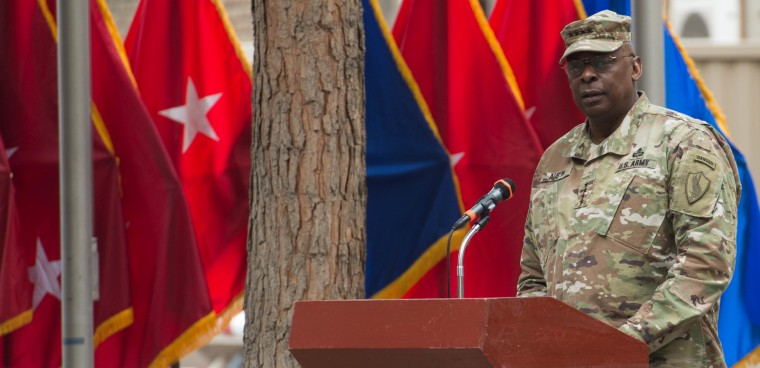Austin tackles cyber and social policy in nomination hearing

Senators question defense secretary nominee about cyber and racism as several National Guardsmen removed from inauguration duty.

Army Gen. Lloyd J. Austin III in 2016. (DOD photo.)
Senators peppered President-elect Joe Biden's pick for defense secretary, Lloyd Austin, with questions about cybersecurity policy, sexual violence and racism in the military, during a Jan. 19 Senate Armed Services Committee nomination hearing.
Sen. Richard Blumenthal (D-Conn.) asked one of the most pointed questions about the SolarWinds hack and whether Austin would initiate a "top-down review of our cyber operations, including DOD's posture and structure, and to making our adversaries pay a price when they attack us as the Russians did through SolarWinds."
"The most recent attack on our country was by Russia, which for months literally intruded, interfered, and attacked our nation in cyberspace, in part, because as [National Security Director and head of U.S. Cyber Command] Gen. Paul Nakasone testified to us, our adversaries do not fear us," Blumenthal said.
Austin committed to the cybersecurity review and to joining the ongoing review of SolarWinds impact on DOD. He also indicated in his responses to advanced policy questions that the U.S. needs to be more proactive in cybersecurity and operations to counter persistent malicious cyber campaigns by China and Russia.
"I believe the Department must effectively counter these campaigns by taking proactive action to: generate insights about the adversary's cyber operations and capabilities; enable its interagency, industry, and international partners to create better defenses, and; acting, when necessary, to disrupt adversary cyber actors and halt malicious activities," Austin wrote.
"Any intrusion operation is of great concern to the security of our systems and country," Austin said. The SolarWinds compromise is "greatly concerning, as it impacts a wide swath of American public and private networks."
Austin turned that focus inward, saying that, if confirmed, he would conduct a review of DOD's own cybersecurity practices and tools, including the effectiveness of DOD's Network Cybersecurity Accountability Scorecard that tracks a component's cyber risk, the pilot for a weapons cybersecurity accountability scorecard, and the Cyber Risk Mitigation Tool used to track vulnerabilities and resolutions in weapon systems and critical infrastructure.
But his cyber workforce priorities stuck out, envisioning a "basic level of digital competency and awareness of artificial intelligence and machine learning capabilities for the majority of our workforce," Austin wrote.
Austin also pledged to push for cyber workforce recruitment, training, and retention, and "improve cybersecurity training, personal responsibility and awareness for the entire workforce."
While it didn't come up in the hearing, Austin noted the benefits and risks to having the same person lead Cyber Command and the NSA, effectively punting a firm position on the matter. But the retired former head of U.S. Central Command wrote that he would confer with the Director of National Intelligence and Joint Chiefs of Staff as to whether U.S. Cyber Command and National Security Agency should be led by the same individual.
"One leader controlling both organizations provides agility and seamless coordination, however, it also may generate risk to both organizations as that same leader is called on to balance priorities of each role and respond to multiple chains of command," Austin wrote.
A historic nomination on the heels of an insurrection
Austin, who would become the first black defense secretary if confirmed, had to contend with many questions on social policy changes to address white supremacy and sexual violence in the military over the course of the nearly four-hour hearing.
In his opening remarks, Austin called out racists and extremists "in our own ranks."
"We also owe our people a working environment free of discrimination, hate and harassment. If confirmed, I will fight hard to stamp out sexual assault to rid our ranks of racists and to create a climate where everyone fit and willing has the opportunity to serve this country with pride and with dignity," Austin said in his opening statement.
"The Defense Department's job is to keep America safe from our enemies. But we can't do that if some of those enemies lie within our own ranks," later testifying that constant engagement was needed on issues like sexual assault and racism.
Austin's hearing came after a dozen National Guard members were pulled from inauguration duties guarding the U.S. Capitol, White House, and other federal property. Two were removed following what DOD officials called "inappropriate" comments related to extremist beliefs or groups, while the others were flagged for otherwise concerning information during the vetting process, defense officials told reporters Jan. 19. Twenty-five thousand National Guard members are activated for the presidential inauguration Jan. 20.
The incident, following the insurrectionists attack on the U.S. Capitol Jan. 6, have raised questions about DOD's vetting process and whether something was missed during recruiting.
"I think we can do a better job of screening the folks that we bring in. I also think we need to do a better job of once we have people on board, that we're paying attention to them, that we're creating the right kind of environment for them to live in, and that they are embracing the values we think are important in the military, and the values that are important for this country," Austin said.
The retired four-star general's comments and the National Guard members' removal comes after the Defense Department completed an internal diversity and inclusion report that called for more study regarding recruitment, career barriers, and "culture, worldview, and identity" recommendations following the protests against discriminatory police killing of George Floyd in May.
"I think this is a thing we have to work day in and day out," Austin said.



